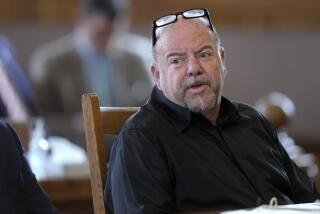3 Wireless Firms Settle Bid-Rigging Suits
- Share via
WASHINGTON — The Justice Department signed settlements Tuesday with three wireless communications firms, including one in Newport Beach, that were accused of rigging bids during government auctions of radio spectrum licenses.
The consent decrees, stemming from suits filed in U.S. District Court in Washington, settle allegations that 21st Century Telesis Corp. of Newport Beach, Omnipoint of Bethesda, Md., and Mercury PCS II LLC of Jacksonville, Miss., signaled one another through coded bids during Federal Communications Commission auctions of licenses for digital personal communication services (PCS).
Under terms of the order, the companies neither acknowledge nor deny guilt and agree that they won’t engage in conduct to allocate markets in the future.
In 1996 and 1997, the FCC auctioned off more than 1,000 licenses covering 493 cities or regions across the country, hoping to create a nationwide phone service similar to the cellular phone system.
According to Justice lawyers, the three companies used their bids to tip off each other to their interest in the licenses they most wanted, thereby making the auctions less competitive.
The government alleged the scheme worked in the following way: Each of the more than 493 wireless regions was assigned a three-digit code. If one of the companies wanted the license in market 302, for example, and another of the companies had bid on it, the first company would submit a bid in a market important to the second, and end the bid with the numbers 302.
“The message was clear: If you stop bidding in my market, I’ll stop bidding in yours,” said Justice lawyer John Nannes.
“At the end of each round of bidding, the FCC would announce both the identity and the amount of the highest bidders,” Nannes said. “So people could communicate through the bidding process without having to communicate with each other.”
The scheme was unusual, Justice attorneys said, in that it allowed the players to communicate without speaking. Instead, they turned the FCC into an unwitting participant in the scheme.
As a result of bid-signaling by the three companies, the government raised less money than it otherwise would have for licenses in Indianapolis; Toledo, Ohio; and Lubbock, Texas, according to the complaint. Licenses in some cities sold for as much as $4.8 million.
21st Century referred reporters to its Washington attorneys, who were not available.
Previously, 21st Century had acknowledged that during an auction that ended May 1996, they used the FCC’s code for Indianapolis as the last three digits of a bid it placed on a license for Baton Rouge, La. The company ultimately won a license for Indianapolis at a later auction.
The company said at the time it disputed the contention that the use of codes amounted to an attempt to rig the bidding.
Omnipoint spokesman Terry Phillips said his company, one of the country’s largest PCS players, doesn’t believe it did anything wrong.
“We’ve been talking about this practice for some time in the industry,” he said. “Nobody thinks it’s collusive or illegal. It’s kind of a game that’s played, a negotiating tactic. In some ways, it makes the process more competitive.”
Officials at Mercury PCS pointed out that the FCC has changed its procedures so signaling through bid quotes is no longer possible.
More to Read
Sign up for Essential California
The most important California stories and recommendations in your inbox every morning.
You may occasionally receive promotional content from the Los Angeles Times.












